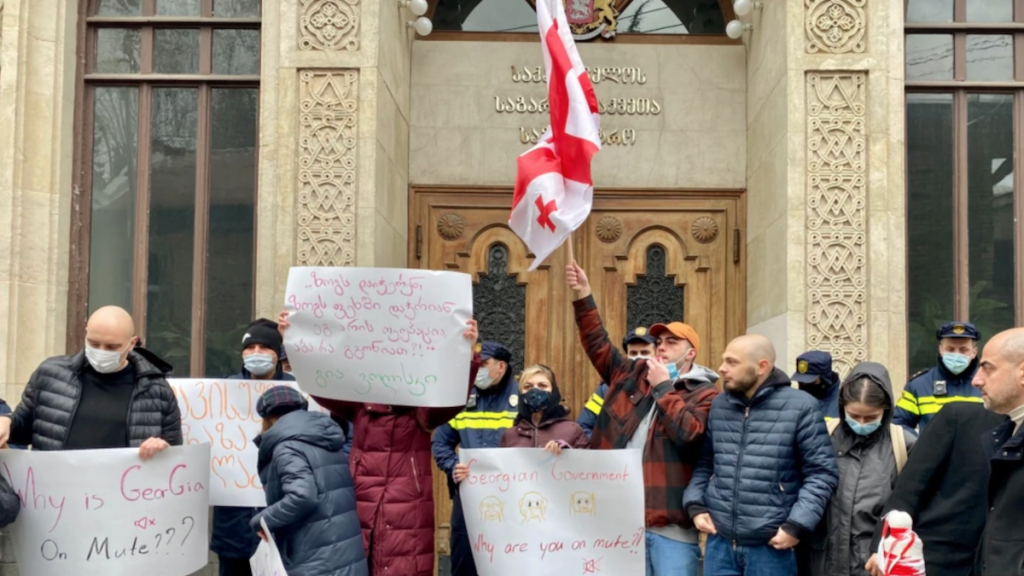12 years for picking mushrooms in S. Ossetia – Tbilisi demands release of Georgian citizen
Activists held rallies on February 8 in front of the former building of the Russian embassy in Tbilisi and later in front of parliament, demanding the release of Georgian citizen Zaza Gakheladze, who was recently sentenced to 12 years in prison by a South Ossetian court on two counts – attempt on the life of a military serviceman and ‘illegal crossing of the state border.’
Gakheladze has been in a Tskhinvali prison since July 2020.
The actions of Tbilisi activists are directed not only against the Russian, but also against the Georgian authorities. Protesters say Tbilisi is inactive because it adheres to a policy of “not irritating Russia,” and this must stop. People call on the authorities to use effective leverage on Russia and free the citizens of Georgia.
“The Georgian government is Putin’s slaves,” read one of the banners.
During the protest, the names of four more Georgian citizens who are illegally detained in Tskhinvali were sounded. These are Gennady Bestaev, Lasha Hetereli, Irakli Bebuya and Ramaz Begeluri.
Several days ago, a large rally demanding the release of Gakheladze was held in front of the Georgian Foreign Ministry.

The case of Zaza Gakheladze
Zaza Gakheladze, 34, a resident of the village of Kvemo Chala in the Kaspian region of Georgia, was detained by Russian border guards on July 11, 2020 near the Skhvilo fortress, which is located near the administrative border with South Ossetia.
During the arrest, Gakheladze was wounded in the leg. The Ossetian side claims that he tried to cross the border, resisted security forces, fired a hunting rifle at least five times and was wounded by a return shot.
The wife of the detainee, Irma Butkhuzi, says that on the day of his arrest, her husband, along with other villagers, was simply picking mushrooms in the forest.
Georgia demanded the release of Zaza Gakheladze at the last round of the Geneva talks in October 2020, but to no avail.
Reaction in Tbilisi
Tbilisi considers the verdict of the Tskhinvali court to be ‘another provocation of Russia aimed at destabilizing the situation in Georgia.’
The Georgian Foreign Ministry appealed to the international community with a demand “to evaluate the next provocation of the Russian occupation regime and take effective measures to ensure the release of the illegally detained citizen of Georgia.”
The Georgian Foreign Ministry’s appeal says that the issue of illegal detention of Georgian citizens on the administrative borders with Abkhazia and Tskhinvali will be raised “at the highest level in all relevant international formats.”
Tbilisi also calls on the Russian Federation to stop human rights violations in areas outside the control of the central government of Georgia.
- Survey: majority of Georgians see prospects for change to improve relations with Abkhaz
- Tbilisi’s offer of ‘informal dialogue with Abkhaz public’ rejected in Abkhazia
- “South Ossetia demands the truth from the world community” – South Ossetian President
International reaction
The US Embassy in Georgia also assesses the imprisonment of a Georgian citizen as a provocation by Russia:
“This verdict is another example of Russia’s attempts to illegally control and exploit the regions of Georgia: Abkhazia and South Ossetia,” the embassy said in a statement.
The embassy accused Russia of “dangerous actions” that endanger the lives of people in the region and demanded that Moscow “fulfill its obligations under the 2008 ceasefire agreement, which included the withdrawal of all troops to pre-conflict positions.”
The embassy said in a statement that Russia should withdraw its decision to recognize the independence of Abkhazia and South Ossetia and ensure unhindered access of humanitarian aid to these regions.
“We express our condolences to Zaza Gakheladze and his family, as well as to all families who have survived the brutal occupation of Russia,” the US Embassy in Georgia said in a statement.
The immediate release of Zaza Gakheladze was also demanded by the EU Ambassador to Georgia Karl Harzel. He urged to use for this the multilateral hotline mechanisms that operate in the zone of the Georgian-Ossetian conflict, including the IPRM, and also raise this issue at the Geneva talks.
Harzel also reminded the Russian Federation of its responsibility for this and other similar incidents.
From the zone of the Georgian-Ossetian conflict, there are regular reports of the detention of Georgian citizens by the Russian military on charges of “crossing the state border.” These are usually locals who either graze livestock or collect the edible jonjoli herb in the nearby forest.
Those arrested are usually fined and soon released. However, this did not happen this time, since in South Ossetia Gakheladze is accused of wounding the military.
Following the August 2008 war, Russia recognized the independence of South Ossetia and Abkhazia. Georgia and most of the international community continue to regard these territories as part of Georgia.
After recognition, Russia signed agreements with South Ossetia and Abkhazia, according to which movement along the separation line (state border, in the terminology of the Ossetian and Abkhaz sides and Russia) is controlled by Russian border guards. Neither Georgia nor the international community recognizes the legality of this agreement.
The Georgian side claims that people are being detained, including in places where there are no barbed wire and “border” signs.
In addition to the Russian military, the forces of the EU observer mission have been deployed in the conflict zone since September 2008, but they only patrol the side controlled by Tbilisi.


















